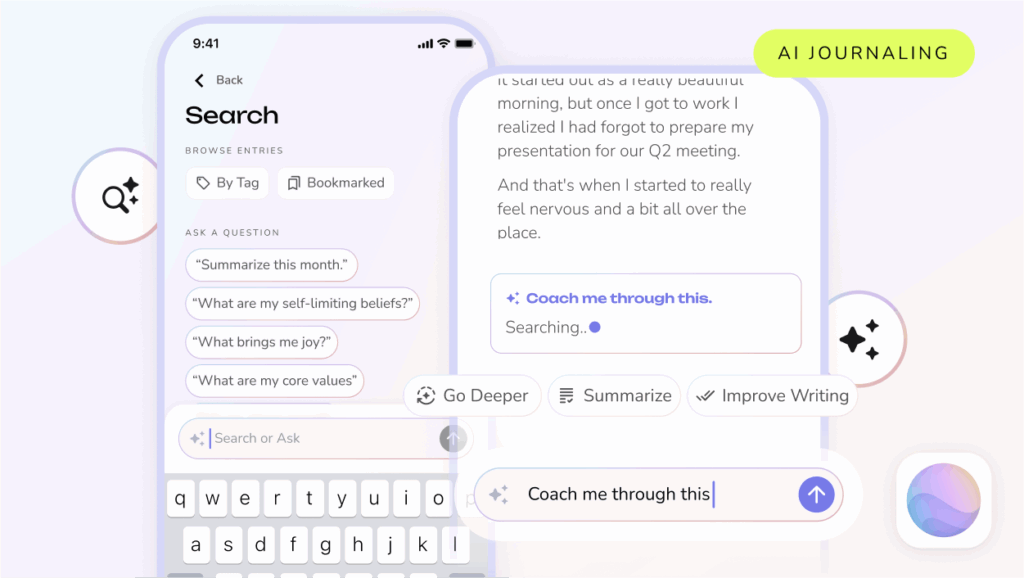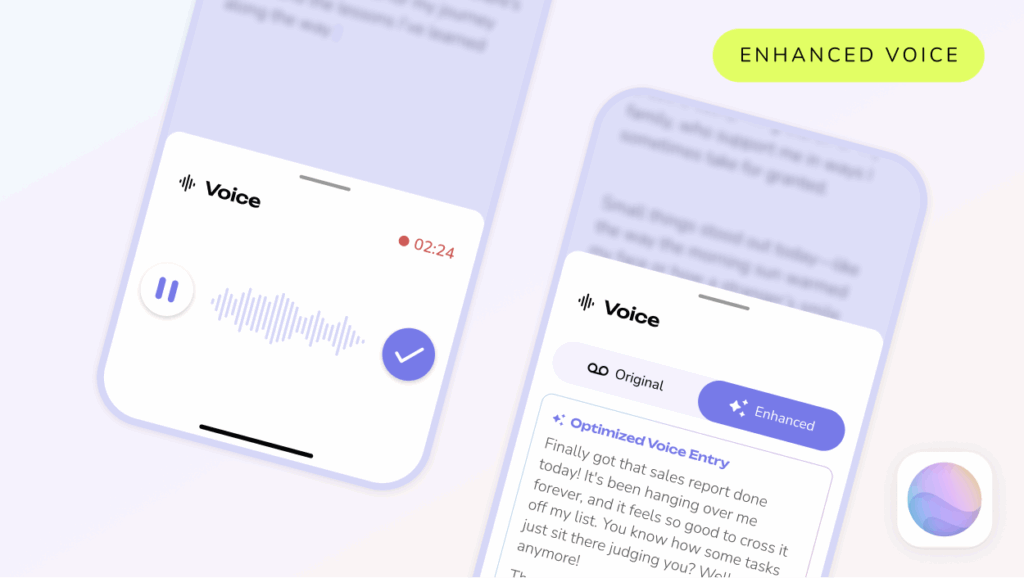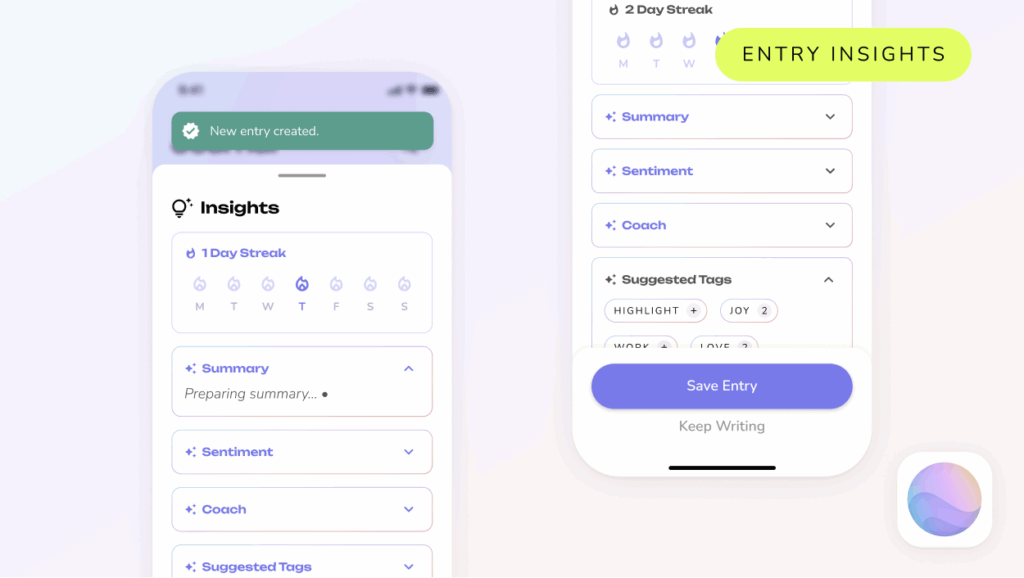Welcome to this edition of our Tools for Thought series, where we interview founders on a mission to help us think better and work smarter. Dave Radparvar is the co-founder of Reflection, private AI-enhanced guided journaling app.
In this interview, we talked about the transformative potential of journaling, how AI can make the experience more meaningful and delightful, how journaling prompts can provide structure and inspiration to deepen your practice, why they focused on creating a writing oasis as their design philosophy, and much more. Enjoy the read!

Hi Dave, thanks for agreeing to this interview! Why do you think we need better journaling tools?
Thanks for having me! It’s a topic I’m really passionate about. There’s been a good amount of research around the benefits of journaling for mental wellness and personal growth—we know it helps reduce stress, gain clarity, foster gratitude, and shift our mindset. But there’s always been this gap between knowing it’s good for you and actually doing it.
The biggest hurdle is often the blank page—not knowing where to begin. Many early digital journals were essentially just text editors, so they didn’t solve this core friction.
But even for people who got past that initial hurdle and built a daily writing habit, most journaling would end there. There was never a practice of reflecting back on what you wrote, no push to go deeper, or help synthesizing what happened over weeks, months, or years. It was really a one-way activity.
While I love the instant clarity and catharsis of journaling, for me, the real magic happens when I go back, see patterns, and use that perspective to inform the decisions I make today. Reflecting consistently helps me live in the moment with more intention—ultimately helping me set the path for the life I truly want to live-—and because of that, I truly believe journaling can have a transformative effect on the trajectory of someone’s life.
So you decided to design an intelligent AI journaling companion.
My journey to Reflection actually started with my previous company, Holstee. We were already focused on creating tools to help people live more fully and mindfully through our community and products. One of our early products was a guided annual review—a physical journal for reflecting on the past year.
I loved the concept, but I found myself spending most of the time on the logistical chore of filling in what happened, leaving less time for the deeper reflection—how the year actually unfolded, how I felt about it, and how I wanted to use those insights to shape the year ahead.
We decided to build a small digital MVP with built-in reflection guides, but we quickly saw it had potential to be something much bigger. A couple years ago, we spun it out as its own company.
Our first step was addressing the “blank page problem” with a library of guided journaling prompts from experts. That was a great start, but the real breakthrough came with AI and the possibility to truly personalize the questions for each person. It became immediately clear—the AI companion wasn’t just a feature, it could become a core part of the experience. As the AI space evolved, we pushed the integration further throughout the entire user experience.
The challenge was—and remains—making the experience feel natural and helpful, not invasive or burdensome. It may sound counterintuitive, but the real goal is to leverage tech to make more sense of the human experience, ideally connecting us more meaningfully with ourselves and the world around us.
Like so much of design, it’s always a balance of how, what, and when to show something to make the experience both delightful and meaningful.
How did you incorporate AI in the user experience?
Our philosophy is that AI should be a thoughtful companion that helps you go one layer deeper. We’ve woven it into the entire journaling process in three main ways.
1) Reflecting Coach. As you’re writing, you can call on our AI companion for real-time coaching. You can get questions to go deeper, gain another perspective, or synthesize your thoughts. You can even ask it to search through your past writing—like “When was the last time I felt this way, and what helped me get through it?”
2) Rich Insights. As soon as you finish an entry, our “Entry Insights” feature gives you an immediate summary, identifies key themes, and suggests tags. It reflects back what you wrote but with a bit of perspective—which also serves as a reminder of how valuable the practice is.
3) Ask Your Journal Anything. This is probably my favorite part. You’re not limited to basic search—you can ask questions and get accurate responses pulling from your entire journal. You can ask practical questions like “Where did I travel in 2024?” or more revealing ones like “What are my biggest self-limiting beliefs?” or “What moments bring me the most joy?” It connects the dots across months or years of your life, revealing insights that would be impossible to find on your own or with a paper journal.
You also decided to partner with wellness experts.
Yes, this was fundamental for us. While AI is an incredible tool for personalization and discovery, we believe it’s most powerful when combined with human-centered wisdom. We’re not therapists or life coaches, but we can partner with the best.
Our guided journaling library is our way of providing structure and evidence-based frameworks for our users. We’ve collaborated with leading experts, authors, and institutions like UC Berkeley’s Greater Good Science Center and Grateful.org to create over 100 guided journaling series on topics ranging from gratitude and grief to shadow work and navigating career transitions.
These journal prompts solve the “what do I write about?” problem for people newer to the practice, while also providing a powerful framework for those ready to do the deeper work of self-understanding. It actually works beautifully in tandem with our AI tools, which can then help people explore their answers on a deeper, more personal level. It’s this combination of expert guidance and personalized AI that we think makes for a truly unique and meaningful journaling practice.
So, how does Reflection work, exactly?
We designed it to be simple and intuitive, but incredibly powerful. When you open the app, you’re greeted with a calm “Today” page that offers a personalized prompt based on things you’ve written about in the past.
From there, you can start with a prompt or new entry. You can type, or use our enhanced voice journaling feature—which allows you to simply dump your thoughts and let our AI give you back a clear, concise, and organized journal entry. It’s perfect for capturing thoughts on the go.
While you write, our AI companion is available with a single tap. I like to think of it as your journaling coach—you can get coaching feedback, gain perspective, summarize your thoughts, or simply ask your own question. Once you save, you get Entry Insights—an instant summary and analysis that helps you understand patterns in your thinking.
For those looking to go deeper, our guide library has hundreds of journaling guides created by wellness and personal growth experts, covering everything from gratitude practices to career transitions. These provide structure and inspiration to help you deepen your practice.
To help build the habit, we have gentle reminders and a streak tracker. And over time, the real magic happens with our AI-enhanced search—it can scan through tens of thousands of entries in seconds, letting you find patterns across years of writing simply by asking a question. From practical queries like “Where did I travel last year?” to deeper explorations like “What are my self-limiting beliefs?”
And importantly—it all syncs seamlessly across our native apps on iOS, Android, macOS, and the Web, so your journal is always with you. So you can start an entry on your phone and finish it on your computer when you get home.
Beyond these core features, we’ve built in things like custom quick templates for journaling frameworks you want to use often, private links for sharing entries trusted friends or therapists, and advanced privacy settings including entry blurring to keep sensitive content private even on your own device.
You were recognized as a “Great New App” in the App Store. Can you please tell us more about the design choices you made.
That was a big honor for our team! From day one, our design philosophy has been to create a
“writing oasis.” In a world of noisy, distracting apps, we wanted Reflection to be a calm, quiet, and safe space for your thoughts.
Every design choice stems from that. We chose a minimalist UI with beautiful typography that gets out of your way so you can focus on writing. We added Dark Mode for late-night reflection that’s easy on the eyes. Our notifications are intentionally sparse—they’re opt-in only and designed to be a gentle nudge, not a nuisance.
Most importantly, we built Reflection with privacy as a foundational principle, not an afterthought. All entries are encrypted in storage and in transit. We believe you can only be truly honest with yourself if you know your thoughts are safe and secure. We also support features like entry blurring, pin lock, and biometric lock, so you can feel comfortable journaling even in a public space or with a shared device. It’s about creating a sanctuary for your mind.
What kind of people use Reflection?
Our community is wonderfully diverse, but the common thread is a mindset of curiosity and a desire for growth. We see a lot of founders, creatives, managers, and students—people who are often navigating high-stress environments or significant life transitions.
They aren’t always looking for a “journaling app”; sometimes they’re looking for a tool to help them manage their thoughts, make better decisions, and understand themselves more deeply. They use Reflection for everything from preparing for a big meeting to processing a difficult conversation, clarifying their career goals, or simply building a daily practice of gratitude and mindfulness.
Ultimately, they are people who believe that a little bit of self-awareness can lead to a more effective and fulfilling life.
What about you, how do you use Reflection?
That’s a great question! I use it in a few different ways depending on the season of life I’m in. But here are a few practices that often stick with me in my daily life.
Most days, I do a bit of free writing in the style of morning pages—writing about 750 words of whatever’s on my mind without thinking or filtering too much. It helps shake out thoughts from my subconscious that I haven’t fully recognized yet. Getting them on paper calms and clears my mind before the day begins. What I love is how the Entry Insights immediately surface patterns I might not have noticed—it often highlights things that were in the background that I didn’t fully appreciate the importance of.
I often take photos of things I experience—moments with my kids, something I ate, travels—and add a quick blurb. At the end of the month when I’m scrolling through my past entries, I see at a glance how many things I have to be grateful for.
When I’m going through something difficult, I find myself journaling a lot more as a way of finding my way through it. I often use voice for this—just talking about how I’m feeling and what’s on my mind. I use the in-app AI coaching heavily here to help me see things from a different perspective and work through whatever I’m dealing with.
I end most days with a simple practice that I’ve since shared as a guide within the app—my Evening Wind Down. I ask myself three questions: What am I grateful for? What am I proud of? And how are my physical and mental health today? It’s simple but powerful for fostering gratitude and checking in with myself as I wind down for the evening.
My journaling practice has been something I’ve been doing for 20+ years. It’s changed and evolved over time, and there have been periods that were more active or less active. Despite all that, it’s always been something I can come back to, especially during particularly challenging times. It’s definitely been there to help me stay grounded when things are really wonderful, but also find solace when things are really challenging.
And finally… What’s next for Reflection?
We’re doubling down on two things: voice and AI. We want to expand Reflection from journaling into the most intelligent and supportive companion for personal growth. Our next big leap is proactive, conversational coaching.
Imagine your journal calling you at a pre-scheduled time, picking up where you left off and asking about things you recently reflected on. Or if you ask it to call you back later, it can update a calendar invite and reach out when you’re ready. When you do choose to chat, you can talk for as long as you like—Reflection will listen and ask guiding questions when appropriate.
We also plan to build in an MCP client so the journal can get more context around your fitness, sleep, and calendar. This helps it connect the dots and ask more specific questions about your day. At the end of each conversation, everything is synthesized and saved as a journal entry, providing richer context for future reflection and conversations.
Our long-term vision is to help millions of people build a better relationship with themselves. In a world that’s getting louder and more demanding, we believe the practice of turning inward is more important than ever. We want to build the tool that makes that practice not just easy, but delightful.
Thank you so much for your time, Dave! Where can people learn more about Reflection?
Thank you for the wonderful conversation! You can learn more on our website or directly download on iOS and Android in the respective app stores. I occasionally share thoughts on building and wellness on my LinkedIn and we’ve begun to share more about our app and behind the scenes of how we build on our YouTube channel. Looking forward to connecting with folks from the Ness Labs community!


